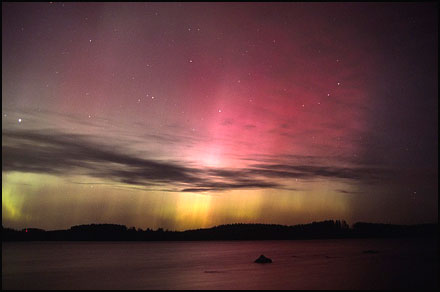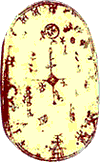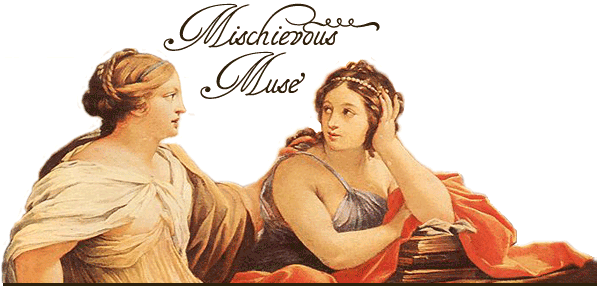Aurora Borealis, Northern Lights, in Mythology and Folklore
By Anniina Jokinen.
This essay is permalinked at Luminarium.

I haven't been able to stop thinking about Tom Eklund's photographs of the Aurora Borealis. I also thought I'd explain a bit about what I meant when I said that I reserve the right to believe they are magical and mystical. There exists a lot of mythology and folk beliefs connected to the aurora.
In Finnish, the name for the aurora borealis is "Revontulet", which literally translated means "Fox Fires." The name comes from an ancient Finnish myth, a beast fable, in which the lights were caused by a magical fox sweeping his tail across the snow spraying it up into the sky.
The Lapps, or the Saami, a people who are a close relative 'race' of the Finns, living in Lapland — that is, north of the Arctic Circle, in what officially are Northern Finland, Sweden, and Norway — traditionally believed that the lights were the energies of the souls of the departed. When the fires blazed in the skies, people were to behave solemnly, and children were admonished to quiet down and be respectful of the fires. It was believed that whoever disrespected the fires incurred bad fortune, which could result in sickness and even death.
 The Lapps believed these fires to have magical effects; Lappish shaman drums often had runes depicting the fires to harness their energy. The lights were believed to have a mellowing effect on arguments, and the time of the fires was beneficial to conflict resolution. The Lapps also had a belief that if you whistled under the Northern Lights, you could summon them closer, and they could whisk you away with them.
The Lapps believed these fires to have magical effects; Lappish shaman drums often had runes depicting the fires to harness their energy. The lights were believed to have a mellowing effect on arguments, and the time of the fires was beneficial to conflict resolution. The Lapps also had a belief that if you whistled under the Northern Lights, you could summon them closer, and they could whisk you away with them.
In Norwegian folklore, the lights were the spirits of old maids dancing in the sky and waving — in Scotland, which had an influx of Viking settlers, the lights are sometimes called "the merry dancers."1 Several of the Eskimo tribes also connected the lights with dancing. Eskimos in Eastern Greenland attributed the northern lights to the spirits of children who died at birth; their dancing caused the dancing lights.2 The Salteaus Indians of eastern Canada and the Kwakiutl and Tlingit of Southeastern Alaska also believed the lights to be human spirits, whereas an Eskimo tribe living on the lower Yukon River believed the dancers to be the spirits of animals.3 Young Labrador Eskimos, who believed that the northern lights were torches lit by the dead who were playing soccer in the heavens with a walrus skull, in turn, would dance to the aurora.4
The belief that the northern lights were caused by ancient heroes battling in the skies can be traced (in writing) as far as Pliny.5 Beliefs that the aurora were portents of war and sickness also can be read in the Greeks; one can only imagine how frightening these mysterious lights must have been in places where the lights were a rare phenomenon. Tacitus recorded in his description of Germany the belief that the fires were the Valkyries riding through the air.6 In the Americas, the Fox Indians of Wisconsin also believed the lights to be an ill omen—they believed the lights to be the ghosts of slain enemies waiting to take revenge.7
Perhaps the loveliest of the beliefs comes from the Algonquin Indians. They believed that Nanahbozho the Creator, after he finished creating the earth, travelled to the far north, where he still builds great fires which reflect southward, to remind those he created of his lasting love.8
For a scientific explanation of what actually causes the Northern Lights, visit the NORDLYS site in Norway. For more wonderful photographs of this phenomenon, visit Tom Eklund's site.
1. Nordlys. Auroral Mythology.
2. Dorothy, J. R., Legends of the Northern Lights, quoted by Kathee Terry.
3. Ibid.
4. Hawkes, Ernest W. "The Labrador Eskimo." Quoted by Kathee Terry.
5. Pliny's Hist. Nat. ii. 26, 27, 33, and 57, quoted in
Angot, Alfred. The Aurora Borealis. New York: D. Appleton & Co., 1897. 9-10.
6. Ibid. 8.
7. Dorothy, in Terry.
8. Ibid.
Photo ©2006 Tom Eklund. Used with permission.
Text ©2007 Anniina Jokinen.
This essay is permalinked at Luminarium.

And I looked, and, behold, a whirlwind came out of the north, a great cloud, and a fire enfolding itself, and a brightness was about it, and out of the midst thereof as the colour of amber, out of the midst of the sky. Ezekiel I. iv. (KJV) |
I haven't been able to stop thinking about Tom Eklund's photographs of the Aurora Borealis. I also thought I'd explain a bit about what I meant when I said that I reserve the right to believe they are magical and mystical. There exists a lot of mythology and folk beliefs connected to the aurora.
In Finnish, the name for the aurora borealis is "Revontulet", which literally translated means "Fox Fires." The name comes from an ancient Finnish myth, a beast fable, in which the lights were caused by a magical fox sweeping his tail across the snow spraying it up into the sky.
The Lapps, or the Saami, a people who are a close relative 'race' of the Finns, living in Lapland — that is, north of the Arctic Circle, in what officially are Northern Finland, Sweden, and Norway — traditionally believed that the lights were the energies of the souls of the departed. When the fires blazed in the skies, people were to behave solemnly, and children were admonished to quiet down and be respectful of the fires. It was believed that whoever disrespected the fires incurred bad fortune, which could result in sickness and even death.
 The Lapps believed these fires to have magical effects; Lappish shaman drums often had runes depicting the fires to harness their energy. The lights were believed to have a mellowing effect on arguments, and the time of the fires was beneficial to conflict resolution. The Lapps also had a belief that if you whistled under the Northern Lights, you could summon them closer, and they could whisk you away with them.
The Lapps believed these fires to have magical effects; Lappish shaman drums often had runes depicting the fires to harness their energy. The lights were believed to have a mellowing effect on arguments, and the time of the fires was beneficial to conflict resolution. The Lapps also had a belief that if you whistled under the Northern Lights, you could summon them closer, and they could whisk you away with them.In Norwegian folklore, the lights were the spirits of old maids dancing in the sky and waving — in Scotland, which had an influx of Viking settlers, the lights are sometimes called "the merry dancers."1 Several of the Eskimo tribes also connected the lights with dancing. Eskimos in Eastern Greenland attributed the northern lights to the spirits of children who died at birth; their dancing caused the dancing lights.2 The Salteaus Indians of eastern Canada and the Kwakiutl and Tlingit of Southeastern Alaska also believed the lights to be human spirits, whereas an Eskimo tribe living on the lower Yukon River believed the dancers to be the spirits of animals.3 Young Labrador Eskimos, who believed that the northern lights were torches lit by the dead who were playing soccer in the heavens with a walrus skull, in turn, would dance to the aurora.4
The belief that the northern lights were caused by ancient heroes battling in the skies can be traced (in writing) as far as Pliny.5 Beliefs that the aurora were portents of war and sickness also can be read in the Greeks; one can only imagine how frightening these mysterious lights must have been in places where the lights were a rare phenomenon. Tacitus recorded in his description of Germany the belief that the fires were the Valkyries riding through the air.6 In the Americas, the Fox Indians of Wisconsin also believed the lights to be an ill omen—they believed the lights to be the ghosts of slain enemies waiting to take revenge.7
Perhaps the loveliest of the beliefs comes from the Algonquin Indians. They believed that Nanahbozho the Creator, after he finished creating the earth, travelled to the far north, where he still builds great fires which reflect southward, to remind those he created of his lasting love.8
For a scientific explanation of what actually causes the Northern Lights, visit the NORDLYS site in Norway. For more wonderful photographs of this phenomenon, visit Tom Eklund's site.
1. Nordlys. Auroral Mythology.
2. Dorothy, J. R., Legends of the Northern Lights, quoted by Kathee Terry.
3. Ibid.
4. Hawkes, Ernest W. "The Labrador Eskimo." Quoted by Kathee Terry.
5. Pliny's Hist. Nat. ii. 26, 27, 33, and 57, quoted in
Angot, Alfred. The Aurora Borealis. New York: D. Appleton & Co., 1897. 9-10.
6. Ibid. 8.
7. Dorothy, in Terry.
8. Ibid.
Photo ©2006 Tom Eklund. Used with permission.
Text ©2007 Anniina Jokinen.
Labels: folklore, mythology, Photography, Weather Phenomena





11 Comments:
Hyvää Runebergin päivää !!! Ootko jo syönyt tortun ?
Täh! Mistäs sitä täällä sais Runebergin tortun? (;_;) byhyyy!
ahhh!!!! no need for torture! ; ; i think this was a great article!
Leivot äkkiä ite :) Kyllä sitä nyt kansallisrunoilijan tortut pitäis pyöräyttää ihan tosta vaan *hehhee*
Mä söin tänään yhden; ei niitä enempää pystykään syömään.
What Katja was asking, Mophia, is if I had a "Runeberg Torte" - a lovely, sickly-sweet pastry named after our national poet Runeberg, since today was a national holiday in his honor :P Sadly, I don't have a recipe for those. I think they might be hard to make, but they sure would have hit the spot today. Thanks for the compliments on the article ^^
What an interesting compilation! Great!
Beautiful image I think one of the most beautiful things in life is seeing those events, I'd like to admire them with my girlfriend and taking my usual generic viagra to get the perfect inspiration.
Done well. We re floored with the excellence of the advice presented. I have high hopes that you continue with the outstanding job done.
Locksmith Bridgeport
Margate locksmith
Locksmith Union City CA
Mountain View locksmith
Locksmith Sunnyvale CA
Locksmith San Jose CA
miami locksmith
locksmith irvine ca
Locksmith Hialeah FL
mesquite tx locksmith
plano locksmiths
plano locksmith
locksmith aventura
irvine ca locksmith
locksmith miami fl
hialeah locksmith
locksmith fort worth texas
pembroke pines locksmiths
locksmith miami
aventura locksmiths
mesquite locksmiths
Locksmith Hialeah FL
plano locksmith
locksmith aventura
locksmith pembroke pines fl
What a beautiful dragonfly and what wonderful post!!I am a china tour lover,You can learn more: luxury China tour packages | Tibet tour | 72-Hour Visa Free Travel
Yes, these are magical lights and looks beautiful. There are many place to see northern lights and the one of the best place is Alaska. So, book now Northern lights trips
This comment has been removed by the author.
Post a Comment
<< Home